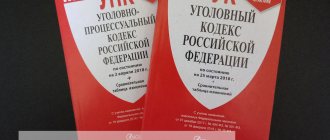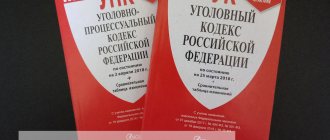The corpus delicti under Art. 109 of the Criminal Code of the Russian Federation - causing death by negligence in everyday life is also called unintentional murder. This article examines what Art. 109 of the Criminal Code of the Russian Federation differs from murder (Article 105 of the Criminal Code of the Russian Federation), what punishment can be faced for causing death by negligence and how a lawyer for manslaughter in Krasnogorsk can help.
According to Article 109 of the Criminal Code of the Russian Federation, murder by negligence is the deprivation of the life of another person as a result of careless actions. It is quite difficult to prove the commission of a crime under this article, and therefore the prosecution very often puts pressure on the suspect if he was not immediately caught red-handed on the spot and did not confess. The task of a qualified murder lawyer in Krasnogorsk is to help the suspect in order to avoid classifying the crime under the more serious Article 105 of the Criminal Code of the Russian Federation.
That is, the work of a lawyer in Krasnogorsk in a criminal case under Art.
109 of the Criminal Code of the Russian Federation in this case will be aimed at the correct qualification of the crime, on which, ultimately, the fairness and objectivity of the imposed punishment will depend. CRIMINAL LAWYER call now: ☎ 8 (495) 532-75-40
Protection under Art. 109 of the Criminal Code of the Russian Federation Causing death by negligence
Causing death in the presence of careless actions is fundamentally different from murder.
The crime is considered completed from the moment the consequences occur, namely, the death of the victim. A prerequisite for qualifying a crime under Art. 109 of the Criminal Code of the Russian Federation is the presence of an established cause-and-effect relationship between the actions of the accused and the death of the victim.
Causing death by negligence carries a maximum penalty of four years' imprisonment. Also, punishment in the form of correctional labor, restriction of freedom, or forced labor may be applied.
Quite often, death caused by negligence is caused by improper performance of official duties by an official, for example, neglect of safety standards, rules, instructions, or other unjustified risk. In this case, in addition to the main punishment, a ban on holding certain positions or engaging in a certain type of activity for a period of up to three years may be applied.
It is necessary to understand that no person can be immune from error. Therefore, if you or someone close to you is charged under Art. 109 of the Criminal Code of the Russian Federation, you should act clearly, without panicking, and seek help from a qualified criminal lawyer in Krasnogorsk, who will provide proper legal support both at the stage of the preliminary investigation and in court.
The lawyer managed to reclassify the case from attempted murder to minor bodily harm.
As AG learned, on December 13, 2021, a magistrate in Moscow dismissed the criminal case against a citizen of Uzbekistan who stabbed his partner several times.
Investigation version
From the decision to implicate her as a defendant (available to the “AG”) it followed that in August 2021, citizen of Uzbekistan N. stabbed his partner twice with a knife against the backdrop of a sudden personal hostility. The incident occurred on a playground near a residential building in Moscow. According to investigators, the knife was stabbed in the area of vital organs - in the chest and neck of the victim.
A criminal case against N. was initiated on August 23, he was placed in custody in one of the Moscow pre-trial detention centers. Subsequently, the interdistrict investigative department of the Main Investigative Directorate of the Investigative Committee of the Russian Federation in Moscow charged him with attempted murder under Part 3 of Art. 30, part 1 art. 105 of the Criminal Code of the Russian Federation. According to law enforcement officers, the guilt of the accused was proven by his testimony, the conclusion of a forensic expert and witness testimony.
The lawyer who intervened in the case petitioned to dismiss the case
Stepan Dilbaryan entered the criminal trial at the invitation of N.'s relatives on October 7. On October 29, the defense attorney petitioned (the document is available from “AG”) to dismiss the criminal case, pointing out that the accusation was clearly unfounded.
The lawyer referred to the fact that the forensic expert’s report indicated that the bodily injuries inflicted on the victim were not life-threatening and did not cause the development of a life-threatening condition. “So, from the case materials it follows that after cutting the victim, N. did not take any further action, although nothing prevented him from doing so. The eyewitnesses were at a considerable distance at the time of the incriminated events and for some time immediately after the cutting. And the wording left in the accusation that the victim’s death did not occur due to the timely provision of medical care to her is in direct contradiction with the conclusion of the forensic medical examination,” the petition noted.
Stepan Dilbaryan added that even if we agree with the conclusion of the investigation that N. had an intent to kill, then the subsequent circumstances should be regarded as a voluntary renunciation of the crime (Article 31 of the Criminal Code of the Russian Federation), since he did not have the ability to complete such an intent no obstacles, the presence of which is mandatory by virtue of Part 3 of Art. 30 of the Criminal Code of the Russian Federation. The defense attorney added that his client intended to stab her with a knife not in the victim’s neck, but in the shoulder. In addition, he believed that N. had incriminated himself when giving evidence.
Nevertheless, the investigation refused to satisfy the lawyer’s request. In the resolution (available from the “AG”) on the complete refusal to satisfy the petition, it is noted that the defense lawyer’s arguments are refuted by data from surveillance cameras, as well as by the testimony of the accused himself. The investigation also did not reveal the fact of a slander on the part of the accused, who was interrogated in the presence of a defense attorney as assigned and without putting pressure on him.
The prosecutor's office returned the case to the investigator
On November 8, the interdistrict prosecutor's office issued a decision to return the criminal case to re-draft the indictment. In this document (available to the “AG”) it was noted that the indictment could not be approved due to incorrect personal data of the person brought in as an accused. In addition, in violation of Part 2 of Art. 220 of the Code of Criminal Procedure of the Russian Federation, the indictment incorrectly cited references to the testimony of one of the witnesses, as well as sheets containing a blueprint of the accused’s passport.
“The violations committed in the preparation of the indictment exclude the possibility of the court passing a verdict or making another decision based on this conclusion. Thus, the criminal case must be returned to re-draft the indictment and eliminate the identified deficiencies,” the prosecutor’s office indicated.
Reclassification of crime
Subsequently, in a decision dated November 22 on the partial termination of the criminal case (available to the “AG”), the senior investigator indicated that the investigation had not reliably established the presence of the defendant’s direct intent to kill the victim. After causing bodily harm to his partner, N. did not take any active steps to complete the intent to kill. To substantiate its position, the investigation referred to Resolution No. 1 of the Plenum of the Armed Forces of the Russian Federation dated January 27, 1999, according to which attempted murder is possible only with direct intent.
In the case under consideration, as the investigation explained, the victim did not offer any active resistance after the injuries were caused, and the intervention of outsiders occurred a significant period of time after the incident. The wound to the neck itself, according to the forensic expert, was not life-threatening.
In this regard, a criminal case under Part 3 of Art. 30, part 1 art. 105 of the Criminal Code of the Russian Federation in relation to N. was terminated on the grounds provided for in Part 1 of Art. 27 of the Code of Criminal Procedure of the Russian Federation, and later he was charged with clause “c” of Art. 115 of the Criminal Code of the Russian Federation (intentional infliction of minor harm to health). The case was sent to the magistrate's court for consideration on the merits.
The magistrate dismissed the criminal case due to the reconciliation of the parties
During the trial, the victim announced reconciliation with N. and petitioned for the termination of the criminal case against the latter. The defendant’s cohabitant argued that she had no claims against him, since he apologized to her and compensated for the harm caused to her.
The defendant did not object to the petition, confirmed the fact of compensation to the victim for harm and explained that he repented of his actions. His lawyer also petitioned the court to dismiss the case in connection with the reconciliation of the parties. In the corresponding petition (available from “AG”) Stepan Dilbaryan, with reference to paragraph 9 of the Resolution of the Plenum of the RF Armed Forces dated June 27, 2013 No. 19, noted that in accordance with Art. 76 of the Criminal Code of the Russian Federation, exemption from criminal liability in connection with reconciliation with the victim is possible if two conditions are met (reconciliation of the person who committed the crime with the victim and compensation for the harm caused to him).
In turn, the representative of the state prosecution objected to the satisfaction of the victim’s request.
In its decision (available from the “AG”) the magistrate’s court indicated that the crime provided for in paragraph “c” of Art. 115 of the Criminal Code of the Russian Federation, belongs to the category of minor gravity, and the defendant is brought to criminal responsibility for the first time. At the same time, he took into account the fact that the accused was not registered with a narcologist or a psychoneurological dispensary, as well as his positive characteristics at his place of residence and work. “The reconciliation of the parties and compensation for harm are evidenced by the statements made by the parties, the accused admitted his guilt and repented of his actions, apologized to the victim, who confirmed that she had reconciled with N. and forgave him, the harm caused was compensated, as indicated in the statement,” - The court noted and decided to terminate the criminal case due to the reconciliation of the parties. The accused was released from custody in the courtroom.
The defense lawyer commented on the progress of the case
In a commentary to AG, Stepan Dilbaryan, lawyer for the Manakov and Partners firm, who defended N., said that the defense in the criminal case was complicated by the fact that the investigator in the first 24 hours after N.’s arrest (i.e., before he entered the case) A protocol was drawn up for interrogating the suspect, from which it followed that he admitted both the intention to kill the victim and the infliction of two stabs with a knife in the area of the latter’s vital organs with the aim of causing her death. “In addition, the investigator drew up a protocol for checking the testimony on the spot and a number of other procedural documents. When I read the protocols signed by him to the principal, their contents and wording caused him bewilderment. He explained that he did not talk about any desire to kill, especially about striking with the aim of killing, but only acknowledged the conflict that had occurred and was sure that this was what he was accused of and that it was in this form that his testimony was included in the protocol.” “, the lawyer explained.
According to the defense lawyer, a careful study of N.’s testimony made it possible to emphasize their inconsistency. “So, in the same testimony, it was first stated that the blow was delivered to the neck area, but a little later it was stated that the blow was delivered to the face area. In the same testimony, it was indicated that the interrogated did not remember where he hit the knife, but he still claims that he hit him in the neck. In addition, according to the testimony, he took a knife out of his pocket and stabbed with it to kill, but for some reason he did not remember exactly how he held the knife and where its blade was directed. All this sounded absurd,” noted Stepan Dilbaryan.
According to the lawyer, such confused testimony of the accused is typical for cases when the person being interrogated is “helped” to compile it by those who understand exactly what formulations are needed for the “correct” qualification and what details are better not to be written before the expert’s conclusion, which otherwise may negate the received testimony (including due to incorrect indication of where the blade was directed and in terms of the direction of the blow). “And for a person who actually intentionally inflicted such a blow, as a rule, it is not difficult to describe his actions in the smallest detail. However, for the effective protection of the principal, the stated contradictions alone were completely insufficient, because there were simply no serious procedural grounds for excluding the specified evidence, and the assessment of this evidence is always a rather subjective matter,” said Stepan Dilbaryan.
In this regard, it was decided to build the defense somewhat differently. Taking into account the specifics of the legislative structure of an unfinished crime (attempt), emphasis was placed on the unproven circumstances that prevent the crime from being completed, the defense lawyer explained. To this end, detailed evidence about the circumstances of the case was examined and given. Further, after familiarization with the materials of the criminal case in accordance with Art. 217 of the Code of Criminal Procedure of the Russian Federation, the defense filed a petition to consider the criminal case by a jury.
“This line of defense was based on the position of the Supreme Court, which indicated that for this category of crimes, jurors should be asked in clear terms the questions provided for in Art. 339 of the Code of Criminal Procedure of the Russian Federation, including the proof of the reasons why the act was not completed. Moreover, this question must contain a description of the factual reason that deprived the defendant of the opportunity to carry out his intentions. At the same time, based on the results of studying the materials of the completed criminal case, a petition was prepared to terminate the criminal prosecution under Part 3 of Art. 30, part 1 art. 105 of the Criminal Code of the Russian Federation (i.e. attempted murder) with detailed motivation, the purpose of which is to indicate to the investigator, the head of the investigative body and the prosecutor that there is insufficient evidence for a jury to issue a guilty verdict under Part 1 of Art. 105 of the Criminal Code of the Russian Federation, taking into account the greater objectivity of such a court,” the lawyer said. In his opinion, focusing on this allowed the prosecutor to more carefully study the case materials and return it to the investigative body, which has already reclassified N.’s actions.
“Since by the time the case was considered in the magistrate’s court, the accused had compensated for the damage caused, the defense invited the victim to petition the court to terminate the criminal case in connection with the reconciliation of the parties, which she did. A similar motion to dismiss the case was filed by the defense,” added Stepan Dilbaryan. He expressed satisfaction with the court ruling that came into force.
What is the corpus delicti?
You can use Article 105 of the Criminal Code of the Republic of Kazakhstan only if the elements of the crime are determined. What does it mean? Usually, this is a certain combination of subjective and objective characteristics specified in the Criminal Code. It is she who defines an action dangerous to society as the fact of a crime.
For example, after breaking up with his girlfriend, a young man could not stand it and committed suicide. The victim's relatives immediately contacted the police and began to prove that there was a deliberate incitement to suicide. The article of the Criminal Code of the Republic of Kazakhstan (judicial practice in civil cases describes in detail a lot of similar examples) can be applied in this case.
But during the investigation it was possible to find out that there was no corpus delicti as such, and the young people separated by mutual agreement. There was no evidence of the girl’s guilt, namely, facts of psychological pressure, violence on her part, infringement of rights, humiliation of human dignity and bullying of the victim. After this, naturally, the case is closed.
Social problem or everyday accident?
It just so happens that a lot of things in our lives are literally written off as unfortunate misunderstandings and accidents. But, as they say in American Alcoholics Anonymous clubs, the first step to recovery is recognizing the problem. So, it exists.
Adolescent children are particularly susceptible to this problem. There are many examples when a schoolchild began to be psychologically bullied by his classmates. They systematically humiliate and insult the dignity of their opponent, and often treat him cruelly, using physical violence and posting videos online. Do they realize that their actions are illegal and that they face the threat of incitement to suicide - an article of the Criminal Code of the Republic of Kazakhstan that leads to imprisonment? In most cases, this question remains rhetorical.
General sentences for murder
Murder is the violent taking of another person's life for any reason.
The law especially emphasizes that this concept refers to another person, that is, suicide is not murder, although it leads to death. Killing animals does not include this.
In current Russian legislation, the intentional deprivation of the life of another citizen is considered in article number 105 of the Criminal Code of Russia. It provides for a minimum sentence of 5 years in prison, a maximum of 16.
The sentences can increase to 20 years, and in some situations life imprisonment or the death penalty may apply. This will happen if the murder poses a great public danger. This includes the following points:
- Double or group murder of several people.
- Deprivation of the life of a citizen because of religious, national or other similar motives, as well as because of revenge.
- Murder of a policeman.
- Committing a premeditated crime with particular cruelty: using an explosion, gas, etc. This also includes the activities of serial maniacs, dismemberment and mass murder.
- Participation in extortion and robbery.
- Contract murder.
In addition to the aggravating factors mentioned above, there are also separate articles, which will be discussed below. They imply other penalties, often more lenient, since the perpetrator is not dangerous to society, and the crime is unintentional.
Sources
- Kishenkova O. V. Social science. Preparation for the Unified State Exam in 2014. Diagnostic work; St. Petersburg [and others]: St. Petersburg - Moscow, 2014. - 203 p.
- Valery Nikolaevich Ivakin Civil law. Special part: lecture notes; Yurayt - M., 2009. - 360 p.
- Criminal procedural legislation of the Russian Federation 2001-2011 / Team of authors. - M.: Prospekt, 2021. - 847 p.
- Gromakovsky, Alexey 3 in 1. Everything you need to pass the traffic police exam: traffic rules, tickets, driving with changes for 2021 / Alexey Gromakovsky. - M.: Eksmo, 2021. - 251 p.
- Law and Economics No. 06/2011; Justitsinform - M., 2011. - 444 p.
Incitement to suicide - article of the Criminal Code of the Republic of Kazakhstan: evidence
Before accusing anyone under Article 105 of the Criminal Code of the Republic of Kazakhstan, guilt must be proven. To do this, as a rule, an investigation is carried out, in which witnesses to the incident, suspects and investigators take part.
In most cases, the entire prosecution system is based on the testimony of possible witnesses. As a result, if the perpetrators are named, they will be held responsible for incitement to suicide. Article 105 of the Criminal Code of the Republic of Kazakhstan, we recall, provides for criminal liability if the guilt of the accused is proven.
On what basis can a criminal case be initiated?
Among the reasons prompting the initiation of a criminal case are the following:
- a written statement from the victim or his relatives;
- confession of a person suspected of atrocities;
- information about evidence leaked to the media (for example, correspondence between the accused and the victim);
- discovery of information about the elements of a crime directly by representatives of law enforcement agencies.
That's why experts say that you can't just prosecute under Art. 105 for incitement to suicide (Article of the Criminal Code of the Republic of Kazakhstan). How to prove the guilt of a suspect and identify elements of a crime in his actions? These are the two main questions that the accusing party should think about before taking any action.
Remember that according to Art. 105 the injured party must be repeatedly threatened, humiliated and otherwise harassed. But isolated cases of harassment that have never been repeated cannot become a reason to initiate a criminal case under this article.





